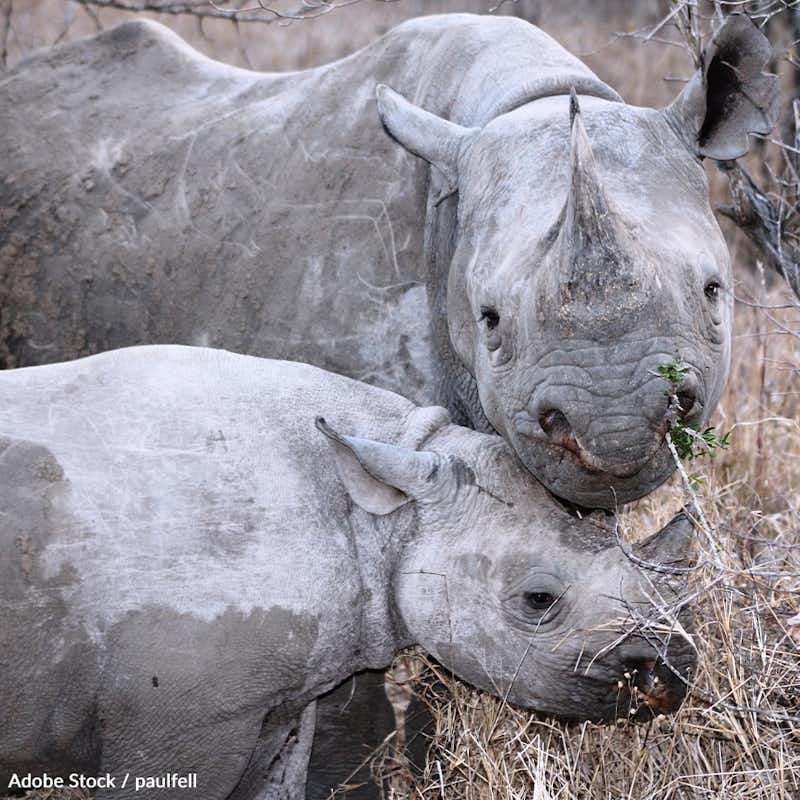Save Black Rhinos from Poachers and Habitat Loss
19,547 signatures toward our 30,000 Goal
Sponsor: The Rainforest Site
The black rhino is facing extinction. Help us halt deforestation, protect critical habitat, and put a stop to poaching!

Rhinos play an important role in their countries; they bring in large amounts of income from tourism and are vital to the ecosystem1. In fact, their dung supports fly, beetle and fungus species, keeping the African plains healthy2.
Sadly, over the past 40 years, rhino population has dropped over 95%3.
The black rhinoceros (Diceros bicornis) is native to eastern and central Africa. It is one of the five species of rhinoceros that still exists today4, and it is considered to be critically endangered due to the many threats that it faces5.
One of the biggest threats to the black rhinoceros is poaching. The demand for rhinoceros horns, which are used in traditional medicine and as a status symbol in some cultures, has led to a significant increase in poaching in recent years6. This has had a devastating effect on the black rhinoceros population, as the animals are killed for their horns and then left to die.
In addition to poaching, habitat loss is also a major threat to the black rhinoceros. The expansion of agriculture, urbanization, and other human activities have led to the destruction of the habitats that the black rhinoceros needs to survive. This has resulted in a decline in the population of black rhinoceros, as the animals have fewer and fewer places to live7.
To help the black rhinoceros avoid extinction, there are several things that must be done. One of the most important things is to increase efforts to stop poaching. This can be done through a combination of measures, including strengthening laws and increasing the number of rangers who patrol the areas where black rhinoceros live8.
Another important step is to work on protecting and restoring the habitats of the black rhinoceros. This can be done through a variety of methods, including setting aside land as protected areas and working with local communities to manage the land in a way that is sustainable for both people and wildlife9.
There are also efforts underway to breed black rhinoceros in captivity and then release them back into the wild10. While this is a complex and difficult process, it has the potential to help increase the population of black rhinoceros and give them a better chance of survival.
Overall, the threats faced by the black rhinoceros are significant, but there are things that can be done to help this species avoid extinction. By working together and taking action, we can help to ensure that the black rhinoceros will continue to thrive for generations to come.
You can help us protect rhinos. With your support, we can halt deforestation, protect critical habitat, and put a stop to poaching.
Sign the Black Rhino Pledge and make a difference!
- Africa Geographic (25 May 2020), "Why are rhinos important for ecosystems?"
- Rinjan Shrestha, World Wildlife Fund (222 September 2022), "Mud, Bugs and Dung: How Rhinos Shape Their World"
- Save The Rhino (2021), "Poaching statistics."
- Bisbees Fish & Wildlife Conservation Fund, "The Black Rhinoceros."
- The IUCN Red List of Threatened Species (2023), "Black Rhino."
- IAPF.org (4 February 2021), "Why Are Rhinos Poached?"
- Save The Rhino (2022), "Habitat loss."
- Sudarsan Raghavan, The Washington Post (27 October 2022), "The perilous 1,000-mile journey to save Africa’s endangered black rhinos."
- World Wildlife Fund (2023), "WWF Is Saving Black Rhinos By Moving Them."
- Save The Rhino (31 January 2019), "Rhino conservation in zoos."
The Pledge:
Rhinos play an important role in their countries; they bring in large amounts of income from tourism and are vital to the ecosystem. They also face great threats from poachers who kill these magnificent animals for their horns.
As such, I pledge to help save this species from extinction through these 10 actions:
- Help to reduce demand for rhinoceros horn by spreading awareness about the fact that it has no proven medicinal value.
- Donate to conservation efforts or volunteer your time to help protect the black rhinoceros.
- Educate others about the importance of conserving the black rhinoceros and the threats that it faces.
- Support policies and legislation that help to protect the black rhinoceros and its habitat.
- Avoid purchasing products made from rhinoceros horn or other parts of the animal, as this fuels the illegal trade in these products.
- Support sustainable tourism efforts that help to protect the black rhinoceros and its habitat.
- Support sustainable agriculture practices that minimize habitat destruction and help to protect the black rhinoceros.
- Support efforts to breed black rhinoceros in captivity and release them into the wild.
- Work with local communities to help them understand the importance of conserving the black rhinoceros and find ways to coexist with this species.
- Support organizations that work to protect the black rhinoceros, such as Greater Good Charities and Project Peril.
Through these actions, I promise to make an effort to halt deforestation, protect critical habitat, and put a stop to poaching.
Pledged by,